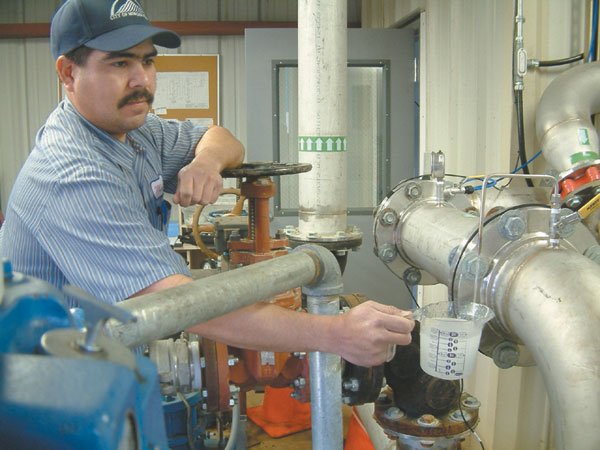It will be several months before State Regional Water Quality
Control Board lawyers decide whether its five members should hear
an appeal filed by Morgan Hill alleging a lower water board
violated the state water code by failing to order a now defunct
road flare manufacturing plant to clean up perchlorate from the
underground subbasin, an official said.
It will be several months before State Regional Water Quality Control Board lawyers decide whether its five members should hear an appeal filed by Morgan Hill alleging a lower water board violated the state water code by failing to order a now defunct road flare manufacturing plant to clean up perchlorate from the underground subbasin, an official said.
The lawyers for the board, which meets in Sacramento and is part of the California Environmental Protection Agency, may decide to remand the appeal back to its subsidiary Central Coast Regional Water Quality Control Board, said spokeswoman Liz Kanter.
Following a marathon discussion and testimony from Morgan Hill City Manager Ed Tewes and Mayor Steve Tate, the board unanimously voted 7-0 to approve a cleanup and abatement order that directs Tennessee-based Olin Corp. to clean up two regions with the highest perchlorate concentration within a 10-mile groundwater plume stretching from the northern edges of Morgan Hill through San Martin and to Gilroy.
“We just received the appeal and it’s being processed and it will be assigned to a lawyer (who) will evaluate how to proceed,” Kanter said Wednesday.
Filed by Los Angeles-based attorneys hired to represent Morgan Hill’s interests, the 62-page appeal argues that action taken by the Central Coast regional board is inadequate because it doesn’t go far enough to bring back the city’s water supply to pristine conditions where a plume of perchlorate now dissipates with contaminant around 6 parts per billion.
“The Subbasin area from which the city draws its water … is significantly degraded and will remain so for decades to come because of the failures of the RWQCB to act as required,” the appeal states.
The appeal says that Olin was previously required to investigate contamination to the northeast of its former facility on Tennant Avenue, where signal flares were manufactured for more than 40 years, but hasn’t done so. Perchlorate was a component in the manufacturing process and the toxic salt seeped into the groundwater.
The rest of the plume would be placed under “monitored attenuation,” a phrase used by engineers to describe monitoring of the polluted water to see whether perchlorate concentration decreases through natural processes. Although perchlorate readings here vary, the state maximum perchlorate level is 6 parts per billion.
The appeal seeks the state board to overturn the lower board’s decision, specifically requiring that Olin use the city’s Tennant Well to treat the groundwater for perchlorate and provide replacement water; require treatment of the Llagas Basin to background – or non-detectable – levels, not the 6 parts per billion perchlorate water levels as directed the cleanup order; and rescind parts of the order that allow monitored attenuation.
“… Olin’s contention was that they already replaced the Tennant Avenue well when they did pay for the development of the San Pedro well,” Tewes told the city council at a meeting on Dec. 19.
The appeal was prepared by Los Angeles-based attorneys Steven L. Hoch and Robin L. Lewis of Brownstein Hyatt Farber Schreck, LLP.
“If it does proceed it won’t be heard for several months,” said state water board spokeswoman Kanter.
A voice message left on Wednesday for David Share, director of environmental programs for Olin, wasn’t returned by press time.
In a letter to the Times on Dec. 22, former Mayor Dennis Kennedy said he thought the board wasn’t “willing to take a strong stance in the public interest” and its inaction was one of the reasons that led to the City Council’s decision to remove the ion exchange perchlorate removal system from the city’s Nordstrom well.
All but one member of the council – Mark Grzan – voted to adopt State Department of Health Services-set perchlorate water level of six parts per billion. The city had used the more stringent level of 4 ppb since 2003, and with the change of the city’s perchlorate reading level, it can now remove the water filtering systems at the Tennant and Nordstrom wells which pump water to thousands of Morgan Hill consumers.
“We tried and tried to make progress with the regional board but I don’t think it would be prudent for us to fold our tent at this point,” said Mayor Steve Tate. “We think we have very good arguments (and) just want to get another opinion.”
Watch a















